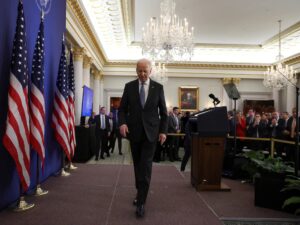
The National Interest Foundation Newsletter
Issue 269, January 17, 2025
Welcome to our NIF Newsletter. In this week’s edition, we examine the Gaza ceasefire agreement that was reached between Israel and Hamas, provide analysis regarding how a recent “60 Minutes” segment detailing dissent over Gaza policy within the State Department sheds light on contradictions in President Biden’s final foreign policy speech, and look into the troubling signs stemming from a delegation of extremist Israeli settler leaders being invited to attend the upcoming inauguration of President-elect Trump.
Editor: Bassam Tarbush
Gaza Ceasefire Agreement Reached Between Israel and Hamas

The ceasefire deal is slated to take effect on Sunday, as deadly Israeli strikes on Gaza continued even after the Wednesday announcement of the agreement. (Photo from AP)
Gaza Ceasefire Agreement Reached Between Israel and Hamas
Earlier this week, mediators from Qatar, Egypt, and the U.S. stated that a Gaza ceasefire and hostage deal had been reached between Israel and Hamas which would halt more than 15 months of the devastating conflict. The agreement is slated to come into effect on Sunday following the Israeli cabinet’s formal approval of it on Friday. Israeli Prime Minister Netanyahu had delayed the cabinet vote which was supposed to take place a day earlier on Thursday to ratify the deal. Meanwhile, deadly Israeli airstrikes in Gaza continued even after the Wednesday announcement of the agreement, killing dozens of civilians and injuring hundreds of others. As of Sunday, the deal is expected to be implemented in three phases which would consist of an array of elements including an initial six-week stop to the fighting, the release of Israeli captives in exchange for Palestinian prisoners, a surge in humanitarian aid, the return of displaced civilians to their homes, the gradual withdrawal of Israeli forces, negotiations leading to a permanent end to the war, and post-war reconstruction efforts.
Reports indicated that Netanyahu’s delay of the cabinet vote was related to far-right extremist ministers’ opposition to the deal, even though it was expected to still be ratified by a majority of the cabinet without the support of extremists like Bezalel Smotrich and Itamar Ben-Gvir. The latter is believed to have asked Smotrich to join forces with him and pull their parties out of the coalition government, potentially causing it to collapse. Earlier this week, Ben-Gvir boasted about Israel blocking a Gaza ceasefire deal “time after time” in the preceding months, debunking claims from various officials and media members who had repeatedly tried to pin the blame for the lack of an agreement on Hamas. In a post on social media, Ben-Gvir stated that “In the last year, using our political power, we managed to prevent this deal from going ahead, time after time.” The remark vindicates what rights advocates had long been saying: that officials from Israel, not Hamas, have been the ones to consistently obstruct and derail efforts aimed at achieving a Gaza ceasefire agreement.
In addition to these political factors that have played a destructive role in the inability to initiate a deal much sooner, the fragility of the Gaza ceasefire agreement is exemplified by concern that Israel could be preparing to resume hostilities after the end of the initial six-week phase of the truce. In fact, one of Netanyahu’s aides emphasized that the deal “includes the option to resume the fighting at the end of phase one if the negotiations over phase two don’t develop in a manner that promises the fulfilment of the war’s goals.” This is particularly unsettling since experts have long criticized the vague and unrealistic “goals” of Israel’s military assault on Gaza, and thus, there is fear that this could be used to try and justify a resumption of hostilities. One of the things that is most disheartening about all of the time it took to reach this ceasefire deal is that details suggest it is almost identical to the proposal that fell apart this past summer, and therefore, tens of thousands of innocent civilian lives could have been saved if it was agreed upon earlier. Back in May, President Biden and U.S. officials presented a draft agreement with the help of additional mediators Qatar and Egypt. This was accepted by Hamas and also received the backing of the United Nations Security Council, yet it faltered when Netanyahu introduced new conditions to the deal and insisted that it would not be made until “the total destruction of Hamas.”
The biggest question now is whether the ceasefire deal will hold and if the first phase will be able to progress to the planned second phase. The specifics of the second phase and its implementation are contingent on further negotiations, which are due to start 16 days into the first phase. At that point, talks will be held that if successful, would allow for the release of all remaining hostages, a permanent end to the war, and agreements on Gaza’s future and reconstruction. Thus, the manner in which phase one is carried out will shape the prospects for phase two and beyond. It remains to be seen if the initial six-week cessation of hostilities turns into a permanent one as hoped, or if Israel’s assault on Gaza ultimately resumes.
Dissent Over Gaza Policy Within the State Department Sheds Light on Biden’s Foreign Policy Contradictions

U.S. policy on Gaza under Biden has prompted widespread dissent at the State Department. (Photo from Reuters)
Dissent Over Gaza Policy Within the State Department Sheds Light on Biden’s Foreign Policy Contradictions
This past Sunday, “60 Minutes” aired a compelling piece which underscored the extensive level of dissent within the State Department regarding U.S. policy on Gaza under the Biden administration. The report highlighted the fact that many believe the government’s mishandling of the Gaza War runs counter to American values and threatens national security, and as such, has led at least 13 officials to publicly resign in protest. Additionally, there has been an unprecedented inundation of internal dissent memos related to the topic as well. One of the major contentions is that the United States continues to send billions of dollars in military aid to Israel despite indisputable evidence of egregious Israeli war crimes and human rights violations being committed in Gaza. There has even been an acknowledgement from U.S. government officials across the board during the course of the conflict – including President Biden himself – that these weapons have been used in indiscriminate attacks against civilians, yet the weapons transfers have persisted nonetheless.
In addition to detailing the large-scale level of dissent on Gaza policy, the segment also shed light on clear contradictions in President Biden’s foreign policy approach. Earlier this week, Biden delivered his final foreign policy speech before leaving the White House. Upon taking office, he had pledged to pursue a foreign policy centered on human rights, but regrettably, a main element of his legacy revolves around steadfast support of Israel despite glaring abuses in this same area. Observers have pointed out how, in his speech, President Biden attempted to put a positive spin on his policies towards the Gaza War. However, it is impossible to ignore the fact that the unwavering support of Israel will be a significant scar on his legacy, particularly as the administration failed to use its leverage over Israel to put an end to the war long ago. Instead, the continued transfer of military aid to Israel amounted to the enabling of heinous atrocities and complicity in them. Biden also brushed over his administration’s repeated disregard of warnings and dissent – both internal and external – which was outlined in the aforementioned segment on “60 Minutes” this past weekend. Through this type of investigative reporting involving former Biden officials, we have come to learn that the administration has always known about the horrors taking place in Gaza and has not acted accordingly.
Furthermore, as some analysts have sought to draw attention to, President Biden and other high-ranking administration officials failed to rebuke Israeli Prime Minister Netanyahu’s government throughout the course of this past year for its obvious efforts to obstruct the prospects of a ceasefire deal while at the same time initiating other regional provocations aimed at perpetuating hostilities. It became apparent that Netanyahu was actively and deliberately seeking a wider regional war that would drag in the United States. Meanwhile, Biden officials blamed past failures to reach a Gaza ceasefire deal on Hamas, even though it was Netanyahu who continually added additional stipulations to agreements and was not called out for this. As one commentator put it, when it comes to U.S. policy on Gaza under Biden, it is evident that his administration has subsidized and enabled Israel’s brutal war to the detriment of American interests and Middle East stability.
Outgoing U.S. Secretary of State Antony Blinken also garnered pushback this week for the nature of his remarks at the Atlantic Council. During the speech, anti-war protesters interrupted and condemned his role in prolonging the devastating conflict in Gaza, commenting that Blinken “had the blood of hundreds of thousands of innocent people on his hands” and that activists have “spent a year trying to appeal to your humanity in front of your house.” In his address to the audience, Blinken tried to lay out a plan for the future of Gaza in which a reformed Palestinian Authority (PA) would govern the territory. Later, he was criticized again for the billions of dollars in military aid that the United States has continued sending to Israel even in light of appalling war crimes and human rights violations. Blinken was also vocally denounced by demonstrators for an incident back in May whereby he told Congress that the United States government has not determined that Israel is blocking humanitarian aid to Gaza, despite numerous sources on the ground and internal findings stating otherwise. This lying to Congress elicited outrage, and had prompted calls for his resignation. Experts point to it as one of the many occasions when Blinken and other top State Department officials glossed over Israeli atrocities at the expense of morality and justice.
Troubling Signs Stemming from Invitation of Extremist Israeli Settler Leaders to Upcoming Trump Inauguration

Israeli settler violence has already been on the rise, and the move signals a further emboldening under Trump. (Photo from AFP)
Troubling Signs Stemming from Invitation of Extremist Israeli Settler Leaders to Upcoming Trump Inauguration
A delegation of extremist Israeli settler leaders has accepted an invitation to attend the upcoming inauguration of President-elect Donald Trump, as he formally takes office for a second term in the White House this coming Monday, January 20th. In addition to attending the inauguration as guests, the group will also hold meetings with new U.S. administration officials. For many fair-minded observers, the move is an alarming indicator regarding the type of biased policy towards illegal Israeli settlements that can be expected with the new Trump administration. Not only are Israeli settlements in occupied territory long recognized by global entities and most countries as illegal under international law, the continued expansion of them in conjunction with an evident rise in settler violence has evoked concern about a further emboldening of these extremist forces. The individuals invited to attend the Trump inauguration consist of those who oversee illegal Israeli settlement activity in the occupied West Bank.
Israeli settler violence has already been on the rise, and analysts fear that President-elect Trump’s return to office could pave the way for the further emboldening of these groups. Human rights organizations have highlighted this disturbing spike, which has seen the launching of an unprecedented level of violent state-sponsored raids on Palestinian villages. This past year in 2024, these entities documented at least 1,400 incidents of settler violence – the highest number ever chronicled since recordkeeping began. The violence has included arson attacks, physical assaults, raids, and the destruction of property. While much of the world’s attention has been understandably diverted to the egregious war crimes and human rights violations taking place in Gaza since October of 2023, at the same time, settler violence and unlawful land seizures in the occupied West Bank have increased dramatically. Video evidence and other accounts also show how Israeli forces often either fail to intervene during settler attacks or even join in and participate in the acts of violence. This has led human rights groups to label the behavior as state-enabled and systematic.
One of the reasons behind why many strongly anticipate pro-Israel measures and actions under the incoming second Trump administration is due to the fact that this was very much the case previously. During his first term in the White House, Trump initiated several policies that exhibited a blatant partiality in favor of Israel. He formally recognized Jerusalem as the capital of Israel and moved the United States’ Embassy from Tel Aviv to Jerusalem. Under Trump, the United States also became the first country in the world to recognize Israeli sovereignty over the long-disputed Golan Heights, despite the rest of the international community continuing to view it as unlawfully occupied Syrian territory. Additionally, the Trump administration cut off all American funding to the United Nations Relief and Works Agency for Palestine Refugees in the Near East (UNRWA) – the agency that provides vital humanitarian assistance and services to millions of Palestinian refugees.
The inauguration invitation extended to settler leaders is far from the only worrying sign that points to skewed U.S. policy on Israel under a second Trump administration. The cabinet picks and officials appointed for pertinent administration positions tied to foreign policy towards Israel do as well. Former Arkansas Governor Mike Huckabee, who has been tapped as the U.S. Ambassador to Israel, is an outspoken supporter of illegal Israeli settlement expansion in the West Bank. Thus, his insertion in the role is likely to further encourage the Israeli government to forcibly take land and build more unlawful settlements. As extremist Israeli settler leaders seem to be hopeful of, there is also trepidation that Huckabee could allow and recognize illegal annexation of areas in the West Bank. Other notable Trump foreign policy-related appointees have also demonstrated clear biases in favor of Israel, including U.S. Secretary of State nominee Marco Rubio, who not long ago sent a letter to the outgoing administration of President Biden criticizing the decision to sanction Israeli settlers linked to the uptick in violence against Palestinians. As such, this appears to be indicative of the type of inequitable pro-Israel policies that can be expected yet again under a second Trump administration.
